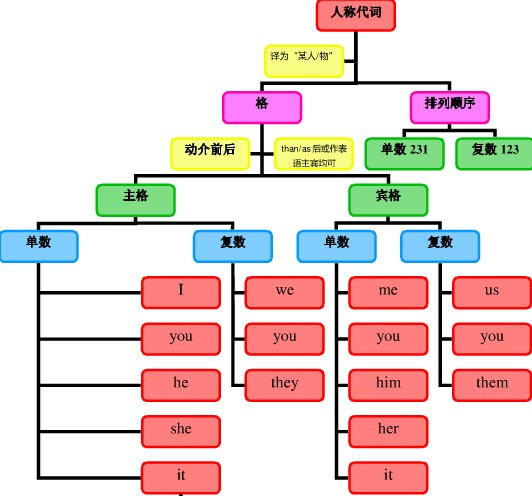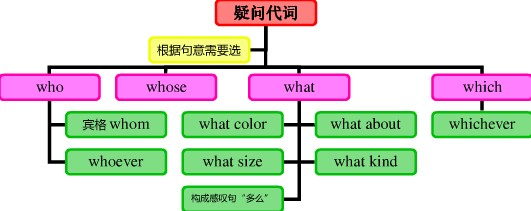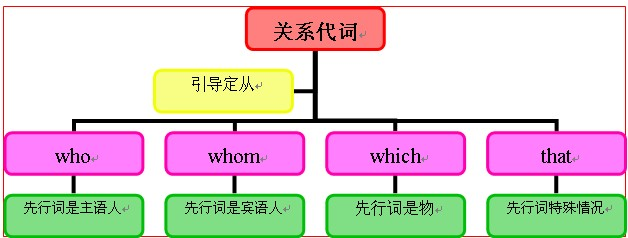本试题 “He bought three books, _____ is in Chinese, ____ in English, and ____ in Japanese.A.the first; the other; the thirdB.one; the other; a thirdC.on...” 主要考查您对人称代词
相互代词
疑问代词
关系代词
等考点的理解。关于这些考点您可以点击下面的选项卡查看详细档案。
- 人称代词
- 相互代词
- 疑问代词
- 关系代词
人称代词的概念:
人称代词是替代我、你、他、她、它、我们、你们、他们、她们、它们等人称的词。
人称代词分为主格和宾格形式,并有人称的单复数形式。按所替代人称的不同分为第一人称、第二人称和第三人称。
人称代词的用法:
人称代词在句中可以用作主语(用主格,如:I,you,he,she,we,they,等)和宾语(用宾格,如 me,you,him,her,us,them等)
如:He loves her, but she hates him. 他爱她,但她却讨厌他。
注:(1)在口语中,当人称代词用作表语、用于than, as之后或用于强调句中被强调时,可以用语。 例如:
"Who is it?" "It's me."“是谁呀?”“是我。”
He sings better than me. 他比我唱得好。
He is as tall as her. 他和她一样高。
It's me who did it. 这是我干的。但是,若than,as后的人称代词后跟有动词,则必须用主格。例如:
He sings better than I do./ He is as tall as she is.
(2)单独使用的人称代词通常用宾格。
"I' m tired.""Me too."“我累了。”“我也累了。”
"Who wants this?" "Me."“谁要这个?”“我要。”
(3)有时用主格或宾格会导致意思的变化。
I like you better than he. 我比他更喜欢你。为 I like you better than he likes you. 之略。
I like you better than him. 我喜欢你胜过喜欢他。为 I like you better than he likes him. 之略。
人称代词主格、宾格、人称、单复数对比:
|
人称代词 |
单数 |
复数 | ||
|
主格 |
宾格 |
主格 |
宾格 | |
|
第一人称 |
I |
me |
we |
us |
|
第二人称 |
you |
you |
you |
you |
|
第三人称 |
he |
him |
they |
them |
|
she |
her |
them | ||
|
it |
it | |||
人称代词的排序:
人称代词的排列顺序为:单数人称代词通常按“二三一”排列,即you, he and I;复数人称代词通常按“一二三”排列,即we, you and they:
You, he and I are of the same age. 你,他和我都是同一年龄。
We, you and they are all good citizens. 我们,你们和他们都是好公民。
但若是用于承担责任或错误等场合,则可把第一人称I置于其他人称代词之前:
I and Tom are to blame. 我和汤姆该受批评。
比较:Tom and I hope to go there. 汤姆和我想去那儿。
注意:you and I 是固定结构,语序通常不宜颠倒。
人称代词知识体系:

人称代词用法拓展:
1、在通常情况下,人称代词在句子中出现在它所代替的名词之后,即先出现名词,再出现相应的代词。但是,在书面语中,有时也可出现代词,后出现代词所代替的名词。
As soon as it had hopped off, the plane picked up speed.飞机刚一起飞,就加了速。
(比较:As soon as the plane had hopped off, it picked up speed.)
2、人称代词后跟名词同位语。有些人称代词后有时可跟同位语。
These small desks are forus students.这些小课桌是给我们学生的。
We girls often go to the movies together.我们女孩子常一起去看电影。
He asked you boys to be quiet.他要你们男孩子安静些。
相互代词的概念:
相互代词是表示相互关系的代词。英语的相互代词只有eachother和oneanother,它们在句中通常只用作宾语。
在现代英语中,each other 和one another在用法上没有什么区别。一般认为each other多用于非正式文体,而one another 则多用于正式文体。在句中,相互代词可用作宾语、 定语等。例如: Don't talk to each other (one another). We must help one another.
相互代词用法:
(1)相互代词在句中通常只用作宾语,不可用作主语,所以相互代词为宾语的句子不能变为被动语态。
(2)不要将相互代词误认为是副词,将其用作状语,如可说 talk to each other,但不能说talk each other。
(3)相互代词可以有所有格形式:
如:The students borrowed each other's notes. 学生们互相借笔记。
They looked into each other's eyes for a silent moment. 他们默默地对视了一会儿。
(4)有时可分开用:
如:We each know what the other thinks. 我们都知道对方的想法。
Each tried to persuade the other to stay at home. 每个人都设法想说服对方留在家里。
(5)有人认为,each other用于两者,one another用于三者,但在现代英语中两者常可换用(即均可用于两者或三者)。
相互代词知识体系:

相互代词的形式与用法:
英语的相互代词只有eachother和oneanother,它们在句中通常只用作宾语。
1、each other:
如:We don't see much of each other. 我们不常见面。
We should help each other. 我们应该互相帮助。
We may never see each other again. 我们可能永远不会再见。
They soon fell in love with each other. 他们不久就互相爱上了。
The sea and the sky seem to melt into each other. 大海和蓝天似乎融为一体。
2、one another:
如:They respect one another. 他们互相尊重(对方)。
You look as though you know one another. 你们看起来像是互相认识。
They were very pleased with one another. 他们相互很喜欢。
疑问代词的概念:
疑问代词用来引导特殊疑问句,放在句首,句子一般读降调。疑问代词还可以引导从句,疑问代词全部属于第三人称,一般为单数,有时也代表复数。
疑问代词有who,whom,whose,what 和 which。
疑问代词的用法:
疑问代词(who, whom, whose, which, what 等)在句中可用作主语、表语、宾语、定语等。
如:Who is your English teacher? 你们的英语老师是谁?
Whose is this umbrella? 这伞是谁的?
Whose umbrella is this? 这是谁的伞?
What question did heask? 他问了什么问题?
Which do you prefer, tea or coffee? 茶和咖啡,你喜欢那样?
注:who和whom只用作主语、宾语和表语,不用作定语,what, which, whose则既可用作主语、宾语和表语,也可用作定语。
两组疑问代词的用法比较:
1、who与whom:
前者为主格,用作主语,后者为宾格,用作宾格。
如:Who spoke at the meeting? 谁在会上发言了?
Whomareyoutalkingabout? 你们在谈论谁?但是,当用作宾语的whom位于句首时,通常可用who代之。
Who(m) is the letter from? 这信是谁寄来的?若是紧跟在介词之后用作宾语,则只能用whom。
2、what,which与who:
①若后接名词(即用作限定词),只用which和what,不能用who。
如:Which/What train did you come on? 你是坐哪次火车来的?
What和which的区别是:
当选择的范围较小或比较明确时,多用which;当选择的范围较较大或不明确时,多用what:
Which color do you like, red, black or white? 红色、黑色和白色,你喜欢哪种?
What color is your car?你的汽车是什么颜色的?
但是,若指人,即使选择的范围不明确,也多which:
Which [What] writers do you like? 你喜欢哪些作家?
②若其后不接名词(即用作代词),三者均可用,which和what的用法区别可参见上面的分析。
至于who,它一般只用来指人(用作代词的which不用于指人),不管选择范围大还是小、明确还是不明确均可用。 如:
Who won? Tom or Mike? 谁赢了,是汤姆还是迈克?
Who is your favorite poet? 你最喜欢的诗人是谁?
当选择范围比较明确且用作宾语时,who也可用which或whichone代之。如:
Who[Which/Whichone]do you like better, your father or your mother? 你更喜欢谁,父亲还是母亲?
③由于what和who的选择范围可以很大或不明确,所以其后可以跟else,表示其他的人(或事物),但却通常不跟表示特定范围的of短语;
而which的选择范围相对比较小或明确,所以其后一般不接else,却常与表特定范围的of短语连用:
Who(What)elsedidyouseethere?你在那儿还看到了别人的什么人(什么东西)?
Which of the three girls is the oldest? 这三个女孩中哪个年纪最大?
④另外,比较以下两句:
"Who is he?" 他是谁?(who指姓名、关系等)
What is he? 他是干什么的?(what指职业、地位等)
两个疑问词同用的情况:
1、Where and when were you born? 你出生在何时何地?
2、When and how did he go there? 他是什么时候、怎么去那儿的?
3、"Where is it?" "Where is what?"“它在哪儿?”“什么在哪儿?”
疑问代词知识体系:

两类易混句型的区别:
What do you think he wants? 你认为他想要什么?
Do you know what he wants? 你知道他想要什么吗?
上面第一句为特殊疑问句,第二句为一般疑问句,它们不能倒过来说成 Do you think what he wants? What do you know he wants?其原则区别是:
可以用yes或no回答者,用一般疑问句的形式(疑问词放在句中,即主句之后),适合这类句型的主句动词通常有know, hear, ask, tell 等;
不能用yes或no回答者,用特殊疑问句的形式(疑问词放在句首),适合这类句型的主句动词通常有think, believe, suppose, guess 等。
如:Where do you suppose he has gone? 你认为他去什么地方了?
Did you ask why he had left so soon? 你问过他为什么那么快就离开了吗?
关系代词的概念:
英语中的关系代词有who, whom, whose, that, which, 它们是用来引导定语从句的。关系代词既代表定语从句所修饰的词,又在其所引导的从句中承担一个成分,如主语、宾语、表语、或定语。
如:This is the man who saved your son. (who在从句中作主语,先行词是man)
The man whom I met yesterday is Jim.
A child whose parents are dead is an orphan.
He wants a room whose window looks out over the sea.
关系代词用法:
1、that与which的用法区别:
两者都可指物,常可互换。其区别主要在于:
(1)引导非限制性定语从句时,通常要用which:
如:She received an invitation from her boss, which came as a surprise. 她收到了老板的邀请,这是她意想不到的。
(2)直接放在介词后作宾语时,通常要用which:
如:The tool with which he is working is called a hammer. 他干活用的那个工具叫做锤子。
(3)当先行词是下列不定代词或被它们修饰时much, little, none, all, few, every(thing), any(thing), no(thing)等时,通常用that:
如:There was little that the enemy could do but surrender. 敌人无法,只有投降了。
All[Everything] that can be done must be done. 凡能做的事都必须做。
(4)当先行词有the very, the only, the same等修饰时,通常用that:
如:This is the only example that I know. 我知道的例子只有这一个。
Those are the very words that he used. 那是他的原话。
(5)当先行词有形容词最高级或序数词(包括last, next等)等修饰时,通常用that:
如:This is the best dictionary that I've ever used. 这是我用过的最好的词典。
The first thing that you should do is to work out a plan. 你应该做的第一件事是订个计划。
(6)当关系代词在定语从句中用作表语时,通常用that:
如:China is not the country(that) it was. 中国已不是过去的中国了。
(7)当先行词是一个既指人又指物的并列词组时,通常用that:
如:They talked about the persons and things that most impressed them. 他们谈论了使他们印象最深的人和事。
(8)当要避免重复时:
如:Which is the course that we are to take? 我们选哪门课程?
2、that与who的用法区别:
(1)两者均可指人,有时可互换:
如:All that[who] heard him were delighted. 所有听了他讲话的人都很高兴。
Have you met anybody that[who] has been to Paris? 你遇见过到过巴黎的人吗?
He is the only one among us that[who] knows Russian. 他是我们中间唯一懂俄语的人。
(2)但是在下列情况,通常要用that:
①当先行词是一个既指人又指物的并列词组时:
如:I made a speech on the men and things that I had seen abroad. 我就我在国外所见到的人和事作了报告。
②当先行词是who时(为避免重复):
如:Who was it that won the World Cup in1982? 谁赢得了1982年的世界杯?
③当关系代词在定语从句中作表语时(可省略):
如:Tom is not the boy(that) he was. 汤姆这孩子已不是以前那个样子了。
关系代词知识体系:

关系代词用法拓展:
1、as与which的用法区别:
(1)引导限制性定语从句时,在such,as,thesame后只能用as,其他情况用which:
如:I never heard such stories as he tells. 我从未听过他讲那样的故事。
It's the same story as I heard yesterday. 这故事跟我昨天听到的一样。
This is the photo which shows my house. 这张照片拍的是我的住宅。
(2)引导非限制性定语从句时,有时两者可互换:
如:I live a long way from work, as [which] you know. 我住得离工作单位很远,这你是知道的。
(3)但在,在以下情况引导非限制性定语从句时,两者不可换用:
①当从句位于主句前面时,只用as:
如:As is known to everybody, the moon travels round the earth once every month. 月球每月绕地球转一周,这是每个人都清楚的。
②as引导的非限制性定语从句应与主句在意义上和谐一致,which无此限制:
如:He went abroad, as[which] was expected. 他出国了,这是大家预料到的。
He went abroad, which was unexpected. 他出国了,这让大家感到很意外。(不用as)
③as引导非限制性定语从句时,先行词通常不能是主句中某个具体的词,而应是整个句子、整个短语或某个短语推断出来的概念,而which则无此限制:
如:The river, which flows through London, is called the Thames. 这条流经伦敦的河叫泰晤士河。(不用as)
④当as引导非限制性定语从句作主语时,其谓语通常应是连系动词,而不宜是其他动词,而which则无此限制:
如:She has married again, as[which] seemed natural. 她又结婚了,这似乎很自常。
She has married again, which delighted us.她又结婚了,这使我们很高兴。(不用as)
2、who与whom的用法区别:
两者均只用于人,从理论上说,who为主格,whom为宾格:
如:Where's the girl who sells the tickets? 卖票的女孩在哪里?
The author whom you criticized in your view has written a letter in reply. 你在评论中批评的那个作者已写了一封回信。
但实际上,除非在正式文体中,宾格关系代词whom往往省略不用,或用who或that代之:
如:The man(that, who, whom) you met just now is called Jim. 你刚遇见的那个人叫吉姆。
不过,在以下几种情况值得注意:
(1)直接跟在介词后面作宾语时,只能用whom,而且不能省略:
如:She brought with her three friends, none of whom I had ever met before. 她带了3个朋友来,我以前都没见过。
(2)引导非限制性定语从句且作宾语时,who和whom均可用,但以用whom为佳,此时也不能省略:
如:This is Jack, who[whom] you haven't met before. 这是杰克,你以前没见过。
与“He bought three books, _____ is in Chinese, ____ in Engli...”考查相似的试题有:
- —What about the services in this hotel?—They are at least as good as, if not superior to, ______ in yours.A.itB.tho...
- --- How do you find your new classmates?----Most of them are kind, but _______ is so good to me as Bruce.A.noneB.no...
- The flood and infection ____ brought along really made the villagers suffer a lot.[ ]A. whatB. thatC. whichD. it
- For Tim this was the beginning of a new life , he thought he would never see .A.whatB.thatC.oneD.it
- ---How did you like the food cooked by Mrs Green?---You could have had _______.A.better everythingB.anything bestC...
- (宁夏银川一中2008届高三年级第三次模拟考试,23)---Do you have New Concept English Ⅵin your shop?---Yes, but no more ...
- As the New Year opens, let us ask what ____ of us can do to create safe communities.A.eachB.everyC.neitherD.none
- I was disappointed with the play. I had expected _____ to be much better.A.thatB.thisC.oneD.it
- The course that Beijing University offers normally attracts 30 foreign students per year, _______ upto half will be f...
- He was so pleased with all _____ we had done for him _____ he wrote us a letter to praise us for it.A. which; whatB. ...